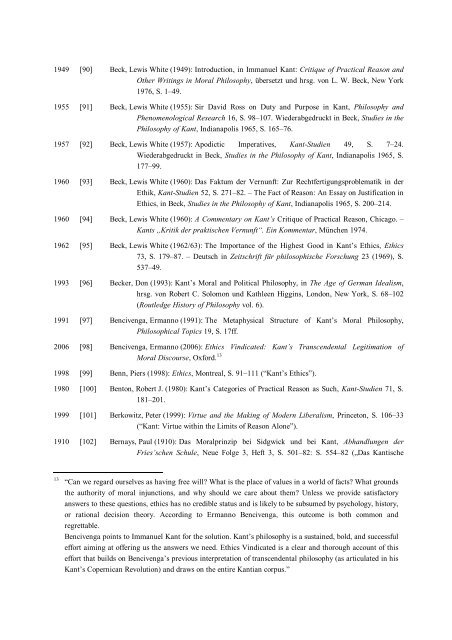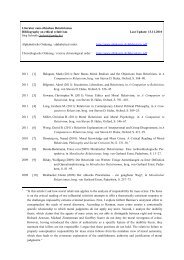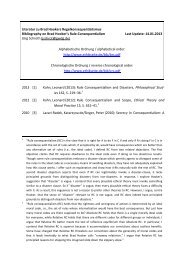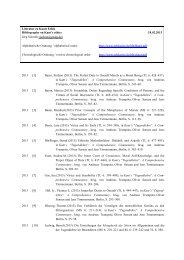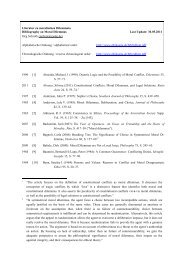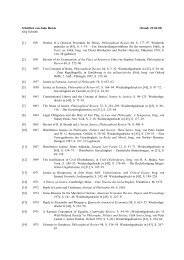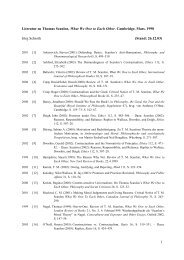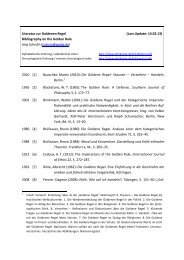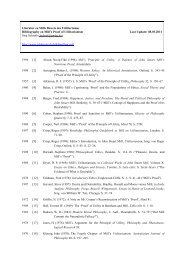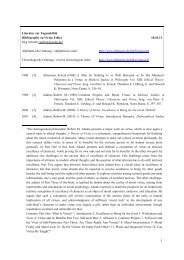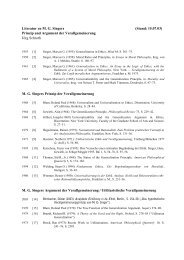Literatur zu Kants Ethik - Ethikseite
Literatur zu Kants Ethik - Ethikseite
Literatur zu Kants Ethik - Ethikseite
You also want an ePaper? Increase the reach of your titles
YUMPU automatically turns print PDFs into web optimized ePapers that Google loves.
1949 [90] Beck, Lewis White (1949): Introduction, in Immanuel Kant: Critique of Practical Reason and<br />
Other Writings in Moral Philosophy, übersetzt und hrsg. von L. W. Beck, New York<br />
1976, S. 1–49.<br />
1955 [91] Beck, Lewis White (1955): Sir David Ross on Duty and Purpose in Kant, Philosophy and<br />
Phenomenological Research 16, S. 98–107. Wiederabgedruckt in Beck, Studies in the<br />
Philosophy of Kant, Indianapolis 1965, S. 165–76.<br />
1957 [92] Beck, Lewis White (1957): Apodictic Imperatives, Kant-Studien 49, S. 7–24.<br />
Wiederabgedruckt in Beck, Studies in the Philosophy of Kant, Indianapolis 1965, S.<br />
177–99.<br />
1960 [93] Beck, Lewis White (1960): Das Faktum der Vernunft: Zur Rechtfertigungsproblematik in der<br />
<strong>Ethik</strong>, Kant-Studien 52, S. 271–82. – The Fact of Reason: An Essay on Justification in<br />
Ethics, in Beck, Studies in the Philosophy of Kant, Indianapolis 1965, S. 200–214.<br />
1960 [94] Beck, Lewis White (1960): A Commentary on Kant’s Critique of Practical Reason, Chicago. –<br />
<strong>Kants</strong> „Kritik der praktischen Vernunft“. Ein Kommentar, München 1974.<br />
1962 [95] Beck, Lewis White (1962/63): The Importance of the Highest Good in Kant’s Ethics, Ethics<br />
73, S. 179–87. – Deutsch in Zeitschrift für philosophische Forschung 23 (1969), S.<br />
537–49.<br />
1993 [96] Becker, Don (1993): Kant’s Moral and Political Philosophy, in The Age of German Idealism,<br />
hrsg. von Robert C. Solomon und Kathleen Higgins, London, New York, S. 68–102<br />
(Routledge History of Philosophy vol. 6).<br />
1991 [97] Bencivenga, Ermanno (1991): The Metaphysical Structure of Kant’s Moral Philosophy,<br />
Philosophical Topics 19, S. 17ff.<br />
2006 [98] Bencivenga, Ermanno (2006): Ethics Vindicated: Kant’s Transcendental Legitimation of<br />
Moral Discourse, Oxford. 13<br />
1998 [99] Benn, Piers (1998): Ethics, Montreal, S. 91–111 (“Kant’s Ethics”).<br />
1980 [100] Benton, Robert J. (1980): Kant’s Categories of Practical Reason as Such, Kant-Studien 71, S.<br />
181–201.<br />
1999 [101] Berkowitz, Peter (1999): Virtue and the Making of Modern Liberalism, Princeton, S. 106–33<br />
(“Kant: Virtue within the Limits of Reason Alone”).<br />
1910 [102] Bernays, Paul (1910): Das Moralprinzip bei Sidgwick und bei Kant, Abhandlungen der<br />
Fries’schen Schule, Neue Folge 3, Heft 3, S. 501–82: S. 554–82 („Das Kantische<br />
13 “Can we regard ourselves as having free will? What is the place of values in a world of facts? What grounds<br />
the authority of moral injunctions, and why should we care about them? Unless we provide satisfactory<br />
answers to these questions, ethics has no credible status and is likely to be subsumed by psychology, history,<br />
or rational decision theory. According to Ermanno Bencivenga, this outcome is both common and<br />
regrettable.<br />
Bencivenga points to Immanuel Kant for the solution. Kant’s philosophy is a sustained, bold, and successful<br />
effort aiming at offering us the answers we need. Ethics Vindicated is a clear and thorough account of this<br />
effort that builds on Bencivenga’s previous interpretation of transcendental philosophy (as articulated in his<br />
Kant’s Copernican Revolution) and draws on the entire Kantian corpus.”


